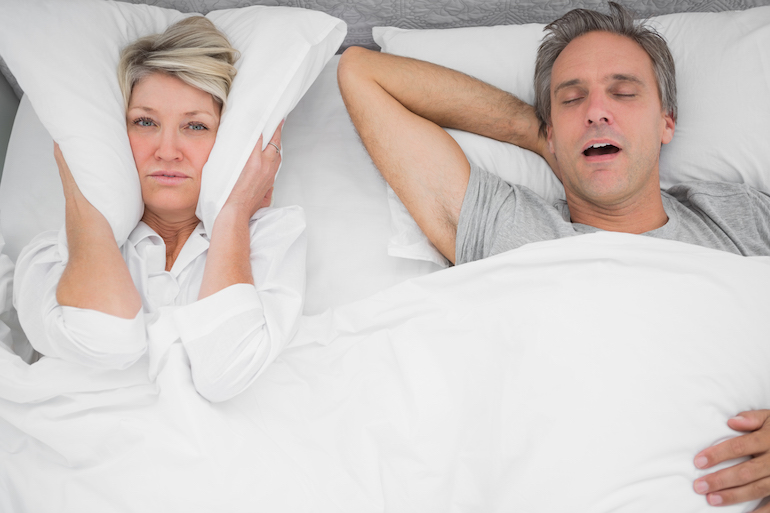
You’re lying in bed one night and your partner is sound asleep. How can you tell? The loud, persistent sound of their snoring. It keeps you up every single night, and you don’t know what to do about it other than go sleep somewhere else. While snoring might seem harmless (if irritating) on the surface, it could actually be the indication of a much more serious condition called sleep apnea, which can be very damaging to both a person’s sleep and long-term health.
What causes snoring in the first place? Is there any kind of treatment that can make it stop? Today, we discuss different factors that can lead to snoring and what you can do about it.
The Usual Suspects of Snoring
There are numerous risk factors that can make a person very likely to snore. Snoring occurs when passing air causes the tissues in the mouth and throat to vibrate. This can be brought on by a multitude of reasons, including:
- Mouth Anatomy: A naturally narrow throat or large tonsils/adenoids can obstruct the airflow and make the tissues more likely to vibrate.
- Alcohol: Alcohol consumption can cause the muscles in the throat to relax and partially block the airway.
- Nasal Congestion or a Deviated Septum: A structural defect in the nose may prevent a person from breathing during sleep, leading to snoring.
- Sleep Deprivation: A lack of sleep can make the throat relax and cause snoring.
- Sleep Position: Sleeping on your back naturally narrows the breath airway as gravity takes effect and makes your tongue and soft palate collapse to the back of your throat.
- Obstructive Sleep Apnea (OSA): This is a serious disorder in which oral tissues partially or completely block the airway during sleep. OSA is typically characterized by loud snoring, broken up by brief periods of silence caused by a halt in breathing.
When Is Snoring Treatment Necessary?
Often, simply improving certain habits can reduce the condition. If snoring is mild and you wake up feeling refreshed, try changing your sleeping position, avoiding alcohol and heavy snacks before bed, or establishing a regular bedtime routine. If snoring is more severe and affects your productivity and mood throughout the day, treatment may be necessary. Consult with a doctor if:
- Snoring consistently causes you or a partner to lose sleep
- You often experience fatigue and sleepiness throughout the day
- Snoring is experienced alongside frequent waking and gasping throughout the night
- Snoring is accompanied by other health concerns, like obesity, depression and anxiety, or cardiovascular issues
These symptoms could mean there is an underlying sleep disorder, such as sleep apnea.
Coping
The first step to fixing the problem of snoring is to see a doctor who can determine the root cause. The origin of the snore plays a big part in determining treatment. Snoring in the nose is often caused by less serious issues, like a deviated septum or a lack of sleep. If snoring occurs in the throat, however, it can be an indicator of a sleep disorder that needs to be treated.
Oral appliance therapy is a great option for people suffering from sleep apnea or sleep-disordered breathing. This comfortable, convenient alternative to CPAP machines has helped millions of people get the rest they need.
At Sleep Better, Georgia, we use custom-made oral appliances to help patients sleep more soundly. Dr. Jeff Rodgers and our team can make sure you get the rest you deserve for great overall health. If you or a loved one has suffered from snoring, and you suspect it may be due to an underlying sleep issue, schedule a free, no-obligation appointment with us today.
